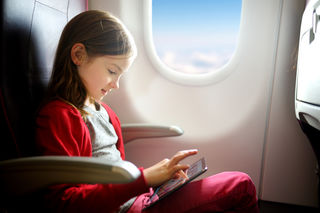Divorce
Don't Feel Sorry for Children Flying Solo
Air travel can offer psychological perks to kids with parents who live apart.
Posted January 7, 2020

Let’s face it: No parent feels completely at ease when putting a child on a plane and waving goodbye. Yet children are increasingly taking to the skies to spend time far from home with a parent or another relative.
Recently, a mom who was concerned about how her son with autism would behave on a flight sent $10 and a letter of explanation for his seat neighbor. What happened next went viral: She received a note back from a man named Ben with a selfie of the two smiling that read, “I was Landon’s seat neighbor for his flight to Portland. He did ask if we were there yet several times, but he was a great travel buddy.” Ben said he’d donated the $10 to the Autism Society.
My own son and daughter have shuttled between Chicago and New York for over a decade since my divorce. The good news is that most children, like mine, are very comfortable traveling alone and take their time in the air in stride. In fact, it’s usually harder for parents when their kids fly alone. I used to wait around the airport until I saw my kids’ plane safely in the air and then walk to my car, feeling very lonely. Of course, my kids probably weren’t thinking about me at all!
As the founder of a website for solo moms (ESME), I was able to speak to several women whose children regularly travel to visit their other parent. “My adult son traveled from New Jersey to California as an unaccompanied minor from the time he was 4 until he was 9,” Elena Schwolsky-Fitch recalls. “I remember how brave and serious he looked with his info pinned to his shirt, clutching his bedraggled stuffed lamb. It was heart-wrenching to let him go. Yet on the other end of summer, he returned relaxed and proud with his silver wings and lots of stories.”
Divorced mom Melissa Stephenson shares that her children have been solo flyers since they were 5 and 8. Now, at the ripe ages of 10 and 13, they “prefer to fly alone because they claim they get unlimited soda and snacks and spend layovers in the fancy airline club, and lament that flying with a parent is a bummer, by comparison.”
Overwhelmingly, the moms I spoke to acknowledge that while it was hard to let their kids go, flight attendants and other passengers were helpful and kind to their children—and that traveling solo instills traits such as resilience, independence, and confidence.
“My 12-year-old has been flying as an unaccompanied minor for a year now,” Gloria Alina Kobow told me. “She’s a total pro! From SFO to Dallas, her dad packs her with an iPad, earphones, coloring books, and snacks, and she’s good to go. On one flight, two older ladies made great conversation and played Uno with her. Now, as a youth flyer, she no longer gets the added attention, so that will be a slight change. But I think she’ll do great!”
There are some basic preparations you can make to ensure your child has the best experience possible. Check the latest regulations and fees for unaccompanied minors, which vary by airline. Always bring your ID for drop off and pick up.
Give your child phone numbers for at least two people near their departure and arrival locations so that there’s always someone they can reach if something unexpected occurs. For younger children, explain that these numbers are important and show them where you’re storing them. Pack extra food for your young traveler in case of delays, along with activities to keep them busy, such as playing cards and coloring books.
The first few times they travel, spell out what to expect and run through what-ifs: What if their flight is delayed? What if they need to use the bathroom? Explain that flight attendants are there to help them. Countless times, my children reported that their flight attendant was “so nice!” or “so cool!” I’m so grateful for their kindness.
Keep in mind that kids will be kids, and not every flight will be perfection. Robin Rogers tells the story of when her very active son took his first solo flight to visit his father. When she asked how the trip went, he replied, “The man next to me was very nice, even when I spilled my nachos on him!”
As more children take to the skies, the primary message from solo moms whose kids are experienced travelers is that they learn skills they might not otherwise gain as readily: to interact with adults, express their needs, and stretch their wings as they travel between those who love them.


